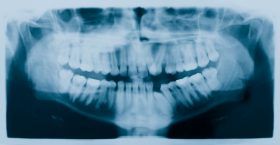If you’re missing a tooth, you’re not alone. According to the American College of Prosthodontics, 178 million Americans are missing at least one tooth.
VOTED GERMANTOWN'S TOP DENTIST

The Consequences of NOT Replacing a Missing Tooth
Dentist Germantown

The Consequences of NOT Replacing a Missing Tooth
Whether it’s due to gum disease, wear, and tear, or an accident, a missing tooth should be replaced as soon as possible. However, many people choose to skip the dentist after losing a tooth, which can lead to oral health problems that are much more costly than a bridge or a dental implant.
In this blog, the Germantown Dental implant experts at Clopper’s Mill Dental Care will discuss the consequences of not replacing a missing tooth with something like a dental implant or bridge.
Bone Deterioration
Teeth don’t just help you speak and chew—they are critical for the overall health of your jaw and mouth. Once you lose a tooth, you lose the protective barrier between the open air and your jawbone, which leads to bone loss, or in medical terms, bone resorption. Once the roots of the tooth are removed from the jawbone, an opening is left in the mouth, and the jawbone will slowly deteriorate over time, leading to pain, discomfort, and an increased likelihood for gum disease, tooth decay, and other oral infections.
Trouble Speaking and Eating
Bone resorption due to tooth loss begins by affecting the toothless area but eventually spreads to other areas of the jawbone. This can cause difficulties with eating, speaking, laughing, as well as digesting food—without full chewing abilities, your digestive system has to work harder to process what you eat. Once jaw pain increases and jaw strength decreases, it might become impossible to eat certain nutritious foods like fibrous vegetables and protein-rich meats, which can make it difficult to consume the nutrients you need for a healthy life. To make problems worse, jaw deterioration can ultimately lead to more tooth loss, making it even more difficult to eat, and compromising oral health.
Change in Face Shape
Jawbone resorption also has its aesthetic consequences, especially if you refuse to deal with your missing tooth or teeth for a long period of time. Losing teeth combined with the weathering of the jaw can lead to sunken-in cheeks and subtle changes in the shape of the lips and chin, even after only five or 10 years. After 15 or 20 years, bone loss progresses at a more rapid rate, leading to the lost definition of the jaw, decreased support to the lips and cheeks, and an older, aged look. To avoid this acceleration in aging, it’s critical to have some sort of prosthetic tooth procedure as soon as possible.
Decreased Self-Esteem
Perhaps the least evident consequence of tooth loss is increased self-consciousness and a lack of confidence—after all, would you have a fully confident smile if you were missing one of your front teeth? More often than not, a missing tooth leads you to smile, talk, and eat less in front of other people—which can have a negative impact on your success in professional, social, and romantic life.
If you’re older and are missing a tooth, it might not be a big deal. But if you’re relatively young, do you want to deal with a lifetime of reduced self-esteem and increased self-consciousness, as well as jaw deterioration and increased risk of oral infections?
Fortunately, with some sort of prosthetic tooth in place, you can regain your confidence and smiling ability, and keep your jaw from experiencing resorption. It might be expensive to undergo a dental implant or bridge procedure—but compared to the costs of treating infections and jaw resorption, your prosthetic tooth will pay for itself.
Methods for Tooth Replacement
If you’re missing one or multiple teeth, there are two main options that restore your smile and keep your jaw in pristine shape.
Dental Bridges
Dental bridges literally “bridge” the gap created by a missing tooth or teeth, using the natural teeth surrounding the gap to support a prosthetic tooth. Dental bridges will prevent teeth from moving out of position, improve chewing and talking ability, and prevent jaw resorption.
With proper oral health habits and a few adjustments by your dentist, a dental bridge can last 10 to 15 years. Plus, they’re almost always cheaper than dental implants, and more permanent than dentures!
Dental Implants
Dental implants are a near-perfect solution for avoiding the consequences of a missing tooth or teeth. While they are more expensive than dental bridges, they are also much more permanent and require much less maintenance. Dental bridges need periodic replacement, but your dental implants are good for life—all you have to do is continue brushing, flossing, and practicing other good oral health habits!
The dental implant process can take a long time, but it is relatively simple. First, your dentist or oral surgeon will perform a bone graft to shape the area where the tooth used to be. A titanium implant is placed in this area and fixed to the jawbone, and allowed to merge into the jaw for a few months. Later, an abutment, or the piece that attaches the crown to the implant, is installed, and once again allowed to merge into the mouth. Finally, a porcelain or metal alloy crown is placed on the abutment—and your smile is back to normal!
Many dental implant procedures can take anywhere from four months to a year to complete, depending on the current state of your jawbone and surrounding teeth. It can be difficult to have the patience for each step of the dental implant process, but the results are worth it—implants are impervious to tooth decay, and since they are rooted deeply into the jawbone, they’ll keep your jaw healthy and sturdy for years to come.
Choose the Germantown Dental Implant Experts!
Dental implants are the most advanced treatment option for missing or lost teeth—so choose the advanced medical professionals at Clopper’s Mill Dental Care to get the job done right. Our dentists and oral surgeons have decades of combined experience working on dental implants, and our friendly staff members will make the entire process simple and easy. Don’t wait for the consequences of missing teeth to befall you—schedule an appointment with Clopper’s Mill Dental Care today!
